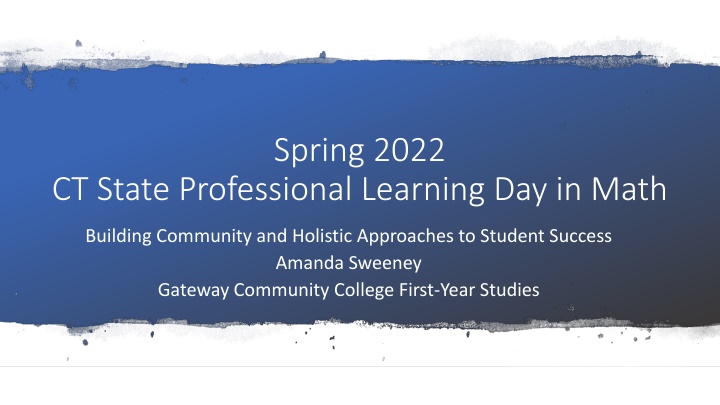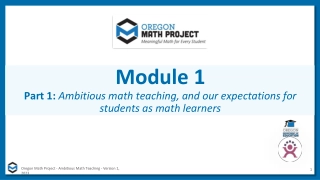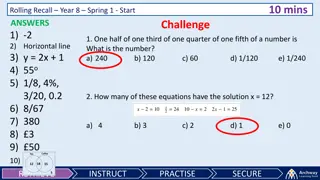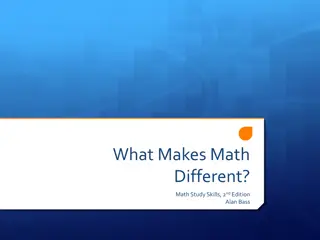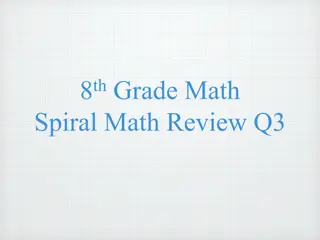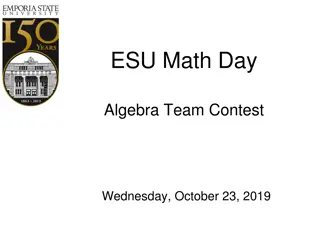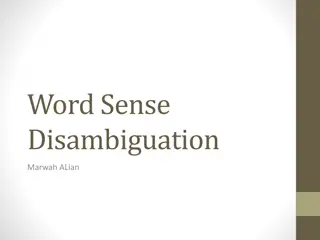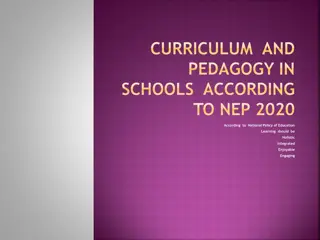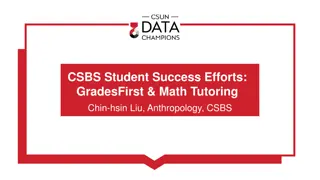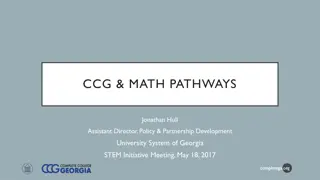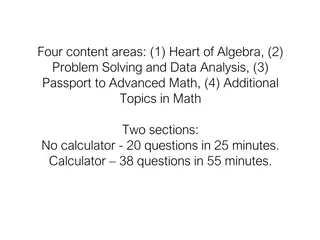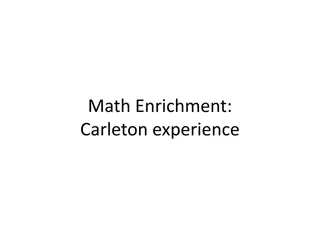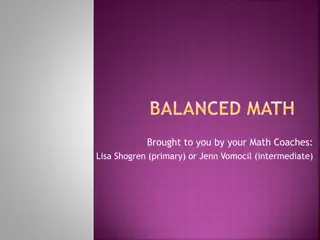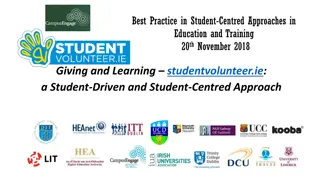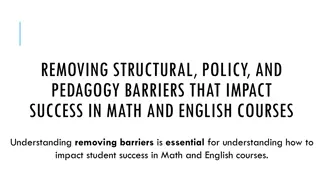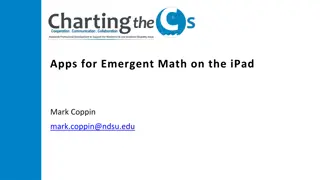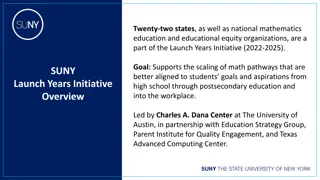Enhancing Student Success Through Holistic Approaches in Math Education
Explore the importance of building community and incorporating holistic approaches to support student success in math education, particularly for first-year students. Learn about the role of the First-Year Studies department at Gateway Community College and the benefits of using icebreakers to reduce anxiety and foster interactions among students. Discover practical examples of icebreakers and the impact of intentional habits on student learning. Embrace the goal of reaching every student, regardless of their math background or confidence level, and understand the significance of self-efficacy in academic achievement.
Download Presentation

Please find below an Image/Link to download the presentation.
The content on the website is provided AS IS for your information and personal use only. It may not be sold, licensed, or shared on other websites without obtaining consent from the author.If you encounter any issues during the download, it is possible that the publisher has removed the file from their server.
You are allowed to download the files provided on this website for personal or commercial use, subject to the condition that they are used lawfully. All files are the property of their respective owners.
The content on the website is provided AS IS for your information and personal use only. It may not be sold, licensed, or shared on other websites without obtaining consent from the author.
E N D
Presentation Transcript
Spring 2022 CT State Professional Learning Day in Math Building Community and Holistic Approaches to Student Success Amanda Sweeney Gateway Community College First-Year Studies
Who am I and what is FYS? Math Faculty: specializing in mathphobic students FYE 111 Faculty: Freshman Seminar (career and academic planning course) FYS-First-Year Studies department: Multi-disciplinary academic department specializing in getting first-year students up and through their first college-level courses in math and English This requires integration of what used to be called hard and soft skills in our curriculum-which I now think of intentional habits
Ice Breaker Use the chat What was your campus mascot and how does this mascot respresent (or not) some aspect of your personality?
Benefits of icebreakers: 1. Reduces both student and instructor anxiety prior to introducing the course. 2. Fosters in a powerful way both student-student and faculty-student interactions. 3. Creates an environment where the learner is expected to participate, and the instructor is willing to listen. Why Ice Breakers? 4. Actively engages students from the onset. 5. Conveys the message that the instructor cares about getting to know the students. 6. Makes it easier for students to form relationships early in the semester so they can work together both in and out of class. - Lansing Community College Center for Teaching Excellence
Other examples of ice breakers Biggest Fear! Have students introduce themselves and identify as a group a course concern. In person, you can amend to a think- pair-pair-share. Start individual, then to a buddy, and then to another pair of buddies and then to the whole class. Two truths and a lie-I love this one when we meet in real life!
What we do matters! Our goal is be reaching every student Those who love math Those who do NOT love math(yet!) Those who have been marginalized in one or more ways Those who are independent learners Those who seek learning opportunities as a collective Those who are confident Those who need to build confidence
Self-Efficacy Successes raise mastery expectations; repeated failures lower them, particularly if the mishaps occur early in the course of events. After strong efficacy expectations are developed through repeated success, the negative impact of occasional failures is likely to be reduced. The effects of failure on personal efficacy therefore partly depend on the timing and the total pattern of experiences in which the failures occur. Self-Efficacy: Toward a Unifying Theory of Behavioral Change (1977)
Its worth it because we can grow it! Intrinsic and extrinsic motivation Subjective Value and Expectancies Subjective value is the extent to which the learning or subject matter is important to the learner Expectancies are the extent to which the learner feels as if they can be successful! Both of these elements must be present for motivation to be high Small Teaching by James Lang
What are intentional habits that grow self-efficacy? To me, it s all about intentional communication and that starts before you even meet your students Encourage contact between students and faculty. Welcome Video Welcome Email/announcement Frequent announcements Post your availability in the syllabus! Communication plan (Posted in the Getting Started folder)
What goes in my Communication Plan? General questions or comments should be posted to the ASK THE CLASS discussion forum so everyone can see both the question and the answer! I encourage you to answer questions posed by others, if you know the answer! This is a public forum viewable by all participants. If you know the answer to a question another student has posted, you are encouraged to post a Reply to that person's question. The only time to contact the instructor directly (by email) is if your question is of a confidential nature or relates to a grade you have received. Otherwise--the question should be added to this discussion forum. I will respond within 24 hours to any personal communications sent via the Gateway email Monday through Friday. I will monitor and reply to unanswered questions in ASK THE CLASS after 24 hours All work submitted through Blackboard will be reviewed and feedback provided on the submission within 5 days. You can view your current grade in the course in the ALEKS gradebook. I do NOT use the Blackboard gradebook except as a vehicle to allow you to view feedback on submitted works. The grades in Blackboard are not reflective of your overall grade. While this class is an LRON course, you are not alone! Please refer to the syllabus for all due dates and suggested pacing. You can always work ahead within the unit, but deadlines are firm. If you find yourself having trouble keeping up, contact me so we can create a success plan. You are encouraged to attend live remote student hours. You also need to work together! You can enter use the tab on the left "virtual classroom" to meet your peers anytime, any day. You can schedule with each other through the ASK THE CLASS discussion board and you can invite me as well.
Intentional Habits 2. Develop reciprocity and cooperation among students.
Intentional Habits Give prompt feedback .what is feedback? So much more than a grade! This is a great start. I would like you to include in your letter some translations of the lyrics to help me understand the connection between each song and the event, since I don t know these songs. Email Thanks for your detailed reply. You can watch the videos for the entire unit at your pace. And work ahead in aleks and on the projects too for the entire week at a clip. If you have trouble accessing anything let me know. Be a part of the discussion boards
Intentional Habits Emphasize time on task. Your syllabus can be usual for accomplishing this.
Intentional Habits Communicate high expectations.
Intentional Habits Respect diverse talents and ways of learning-This can take some intentional planning but the rewards are big!
01 02 03 Ensure that minoritized students see themselves in syllabi, assignments, and other instructional materials (texts, ideas, special projects, etc.). Make race visible in syllabi including texts, videos, and other teaching artifacts authored by racially minoritized scholars, authors, and cultural critics. Create a learning plan to become familiar with minoritized writers, poets, sociologists, political scientists, philosophers, scientists, mathematicians, artists, and musicians. Universal Design for Learning and Equity- Mindedness and early actions
Digital Divide FCC reports 21 million Americans don t have any internet connection, and as many as 163 lack reliable high-speed connections.
We can fix everything, but we can be intentionally aware of many things Machine differences: laptops, tablets, cell phone only No or outdated machines No or slow internet access No webcam or microphone No private area for joining synchronously No printer Is this equitable?
How do we grow self-efficacy once we have them in class? Tell great stories! When emotions are present, our cognitive capacities can heighten so if can open class by the capturing the attention of our students and activating their emotions with a story, we are priming the them to learn whatever comes next Invoke Purpose: Students need regular invocations of the larger purpose of individual exercises, class periods, and course units regular invocations of purpose are essential to creating a climate that fosters and rewards deep, intrinsic motivation. Small Teaching by James Lang
How do we grow self-efficacy? Show enthusiasm and compassion! If you don t care about the content nor will they! You have to be excited about your work! Capture their attention early..shocking stories work well! Come to class early and spend the time getting to know the students as people outside your course. Keep circling back to purpose! One of the primary sources we develop self-efficacy is thru mastery experiences Nothing succeeds like success -prior successes need to be reminded, connected, and related back to. Another primary source is by learning from others/vicarious experiences group work peer reviewing/sharing/critiquing Public praise inspires! I find very intentional ways to praise my students..even in the discussion board, I will publicly comment, This is such an important question, I am so glad you asked
Other Small Suggestions Call them STUDENT HOURS instead of Office hours Offer the students a way to meet you before the class starts Welcome Video/Welcome email/Welcome Announcement If at least two of these messages are identical you are now double dipping strategies, because you are already establishing with the students you are open to multiple ways of engaging with the course Offer the students a way to pre-engage in BB without too much overload Course Content: Start here folder (AND NOTHING ELSE!) A dedicated syllabus content area E-college links
Resources Lansing Community College Center for Teaching Excellence: https://www.lcc.edu/cte/resources/teachingettes/icebreakers.aspx Adult Virtual Icebreakers: https://sites.google.com/site/adultonlineteachingstrategies/virtualice breakers/adult-virtual-icebreakers Seven Principles Article: https://www.facultyfocus.com/articles/online-education/applying-the-seven- principles-for-good-practice-to-the-online-classroom/ Lang, James Small Teaching. California: Jossey-Bass, 2016. Print Many thanks to the Dana Center for providing suggested readings and quotes!
THANK YOU!!! Thank you for all you do to grow your community! Have a great semester! Email: asweeney@gatewayct.edu
